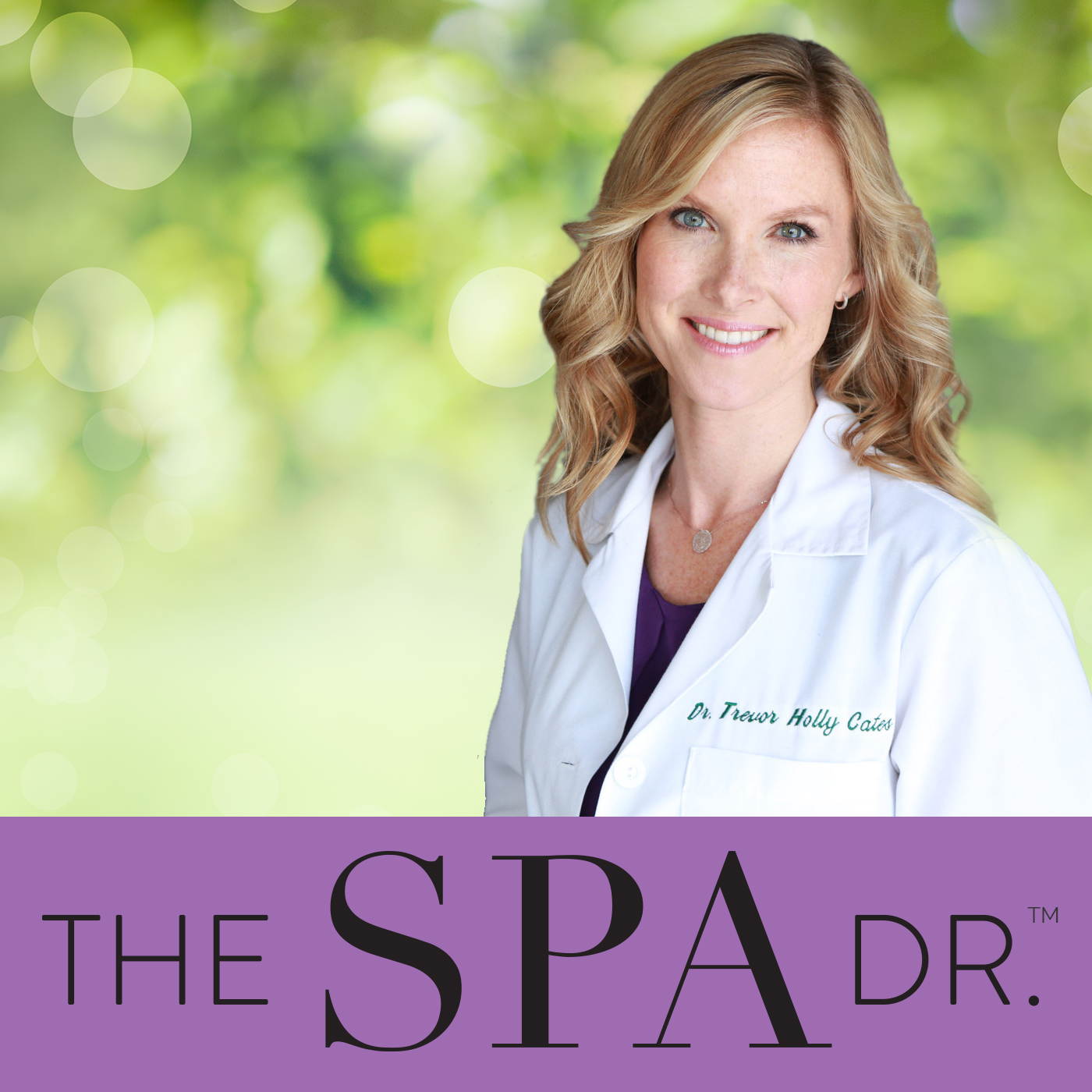
627.4K
Downloads
256
Episodes
Dr. Trevor Cates of TheSpaDr.com answers your questions, busts health myths, and interviews leaders to empower you to be smart, sexy and strong at any age.
Dr. Trevor Cates of TheSpaDr.com answers your questions, busts health myths, and interviews leaders to empower you to be smart, sexy and strong at any age.
Episodes
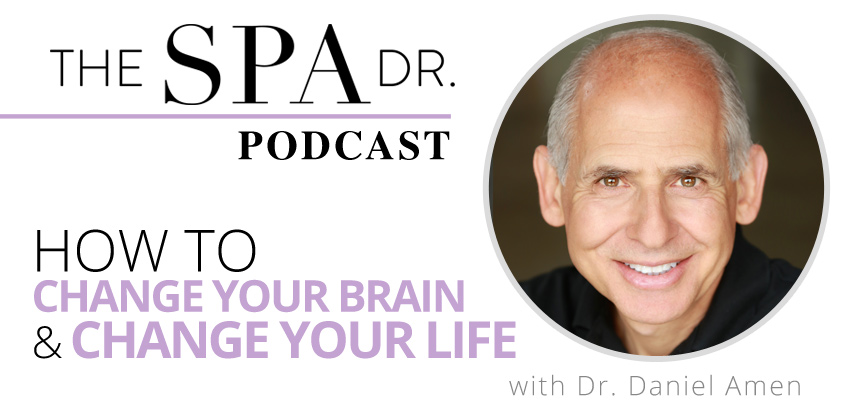
Monday Nov 30, 2015
How to Change Your Brain and Change Your Life with Dr. Daniel Amen
Monday Nov 30, 2015
Monday Nov 30, 2015
Our guest Dr. Daniel Amen is a psychiatrist and the founder of Amen Clinics. Dr. Amen is an expert in brain health, and explains to us how improving the health of our brains can lead to a better, healthier, and more successful life. He stresses that you are not stuck with the brain you have, and that you can create a healthy brain (and life) by engaging in healthy lifestyle and diet habits.
You’ll also learn in this conversation:
- Factors that harm our brains
- Factors, foods, and supplements that promote brain health
- His personal recipe for a brain-healthy breakfast
How much caffeine is harmful to your skin and brain? Find out at the 6 minute mark.
What harms your brain?
- Head injuries
- Drugs and alcohol
- Being overweight
- Having diabetes, hypertension, or eating too much sugar
- Sleeping fewer than 7 hours each night
- Aging
What helps your brain?
- Being conscious of brain health
- Clean air
- Interacting with emotionally healthy people
- Diet and supplements
Diet and Supplements
Dr. Amen stresses that what you eat has an enormous impact on your brain. He recommends a diet that is roughly 70% plant based and 30% high quality protein with healthy fat. Specific brain-healthy foods and supplements he recommends are:
- Nuts and seeds
- Organic blueberries and raspberries
- Cooked herbs and spices (e.g. sage, turmeric, garlic, oregano, basil)
- Grilled or baked wild fish at least once a week
- Multivitamins
- Omega 3 fatty acids: Balance of 60% EPA and 40% DHA. The recommended dosage is 1 gram/day for children and 3 grams/day for adults.
- Vitamin D
Quick and Easy Recipe for a Brain-Healthy Breakfast
1. Take half of a cored avocado.
2. Put an egg in the center.
3. Microwave for 1 minute. That’s it!
Whatever’s good for your skin tends to be good for your brain.
A Word on Caffeine
Caffeine constricts blood flow, so it’s not great for the skin and not great for the brain either. A little bit of coffee (½ cup each day) is OK, but 4-5 per day will prematurely age you.
About Amen Clinics
Amen Clinics treats everything from autism and ADHD, to anxiety disorders, Alzheimer’s disease, depression, and everything in between. In treating patients, Dr. Amen analyzes four different areas:
- Biological Factors
- Psychological Makeup
- Social Circle
- Spiritual Parts
This combined with brain imaging provides an overall view of your brain health and acts as a map that tells you where you are and gives you direction on where to go. The aim is to give patients all the tools they need to optimize brain function, and in turn become more consistent, reliable, successful, and loving.
Links to Check Out
Amen Clinics
Change Your Brain, Change Your Life
More About Dr. Daniel Amen
Dr. Daniel Amen is a double board certified psychiatrist, and the founder and director of Amen Clinics. Hailed as “the most popular psychiatrist in America” by the Washington Post, Dr. Amen is the author of over 30 books, including the New York Times Bestsellers The Daniel Plan and Change Your Brain, Change Your Life.
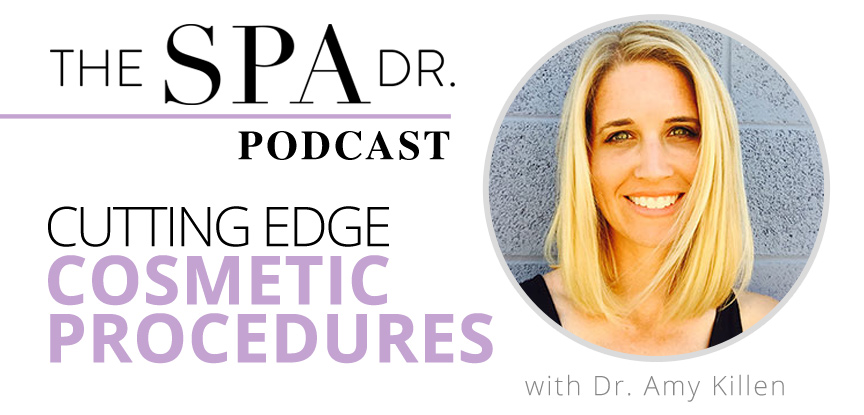
Thursday Nov 12, 2015
Cutting Edge Cosmetic Procedures with Dr. Amy Killen
Thursday Nov 12, 2015
Thursday Nov 12, 2015
My guest Dr. Amy Killen is an expert in anti-aging and regenerative medicine. Dr. Killen received her MD from UT Southwestern and currently practices at Docere Medical in Park City, Utah, where she specializes in anti-aging stem cell therapies.
Dr. Killen works on the cutting edge of anti-aging and regenerative procedures, most of which are natural and require little to no downtime. Today we discuss the latest stem cell therapies and how they can be used to treat everything from fine lines and wrinkles, to sexual dysfunction in both men and women.
Do vampire facials really work or are they just a fad? Find out at the 23 minute mark.
Stem Cell Therapy
Stem cells are located all over your body and are responsible for regenerating new tissue. As we age, not only do we start to lose stem cells, but our remaining stem cells become more dysfunctional. Stem cell therapy starts with retrieving your body’s own stem cells from adipose tissue (fat) with a small, minimally invasive liposuction procedure.
Platelet Rich Plasma (PRP) Therapy
Platelet rich plasma (PRP) is used alone or in conjunction with stem cell therapy. Platelets are collected from blood drawn from your arm. When activated, they release stimulating growth factors that act like “fertilizer” for stem cells.
Stem Cell Therapies Targeting the Face and Neck
Once stem cells are collected from a small amount of fat, they are either concentrated into a small pellet and injected under the skin, or applied topically with a micro needling device.
- Stem cells influence your own collagen to deposit more and promote increased blood flow to the treated area.
- Patients typically see improved skin texture, tone, and color over time.
- It takes an average of 6 weeks to start seeing results.
- The therapy can be topped up with regular PRP treatments.
Micro needling is also called collagen induction therapy. The procedure creates microchannels in the skin that kick start your immune system to rejuvenate the skin.
Vampire Facelifts and Facials
- Vampire Lift: Hyaluronic acid filler (e.g. juvederm, restylane) is first applied to help provide extra volume and structure. PRP is then injected throughout the face.
- Vampire Facial: After the skin is numbed, micro needling is performed and PRP is added topically.
Vampire facials and lifts can be applied in combination with one another for added effectiveness. The combine procedures takes 60 to 90 minutes and requires little to no downtime.
Hair Loss
Stem cell therapy is effective for both men and women, and can be used to treat thinning hair caused by pattern baldness, auto-immune problems, and metabolic issues. The treatment involves injecting stem cells with PRP into the scalp to help thicken and activate hair follicles in areas of hair thinning.
The O-Shot and the P-Shot
Orgasm Shot (O-Shot)
The O-Shot uses PRP to treat female sexual dysfunction. The procedure consists of just two injections and not only improves sexual function, but can also help treat urinary incontinence. Patients typically only require one or two treatments over the course of several months. Additional treatments beyond that are not usually required.
Priapus Shot (P-Shot)
The P-Shot is a similar treatment intended for men. It consists of three to five injections in the penis, and helps with erectile dysfunction and sensitivity.
Effective Therapies for Treating Specific Conditions
- Fine Lines and Wrinkles: Vampire facial
- Deep Wrinkles and Volume Loss: Vampire facelift or stem cell therapy
- Hyperpigmentation: Micro needling with a topical application of stem cells and PRP
- Neck Creases and Nasolabial Folds (smile lines) – Emulsified fat supercharged with stem cells
When Stem Cell Therapy My Not Right for You
Stem cell therapy is not recommended for anyone who is pregnant or breastfeeding, or has active cancer. Therapies may be less effective if you have a platelet problem, chronic immune disease, or are a chronic steroid user.
Links to Check Out
Docere Medical (The clinic is offering 20% off select treatments until the end of November)
Interview with Dr. Harry Adelson
About Dr. Amy Killen
Dr. Amy Killen is a specialist in anti-aging and regenerative medicine. She received her MD from UT Southwestern and did her fellowship with the American Academy of Anti-Aging Medicine. Dr. Killen is certified by the National Institute of Medical Aesthetics in both basic and advanced cosmetic injections, and currently practices at Docere Clinic in Park City, Utah, alongside Dr. Harry Adelson.
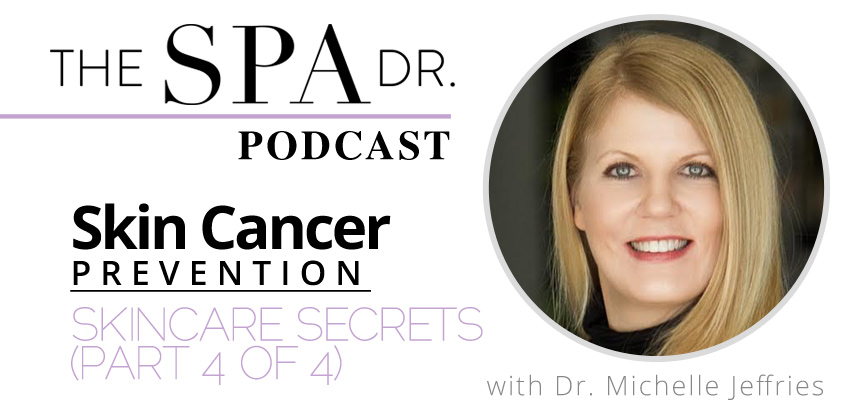
Thursday Nov 05, 2015
Thursday Nov 05, 2015
I am delighted to have Dr. Michelle Jeffries as my guest for the fourth and final part of our Skincare Secrets series. Michelle is an integrated dermatologist and graduate of the Arizona College of Osteopathic Medicine at Midwestern University.
Despite being the most common form of cancer in the United States, there are still a lot of misconceptions about skin cancer. In the podcast today Dr. Jeffries and I clear up a lot of these misconceptions, and also talk about the different types of skin cancers, skin cancer signs and symptoms, how to prevent skin cancer with integrated solutions, and much more.
Not all skin cancer is caused by sun exposure. Find out other risk factors at the 10-minute mark.
Different Types of Skin Cancer
Pre-Skin Cancers
- Typically manifests as a rough or scaly patch on the skin that does not go away
- The risk of these patches becoming skin cancer is relatively low (1% – 10%), but increases the longer they persist
Basal Cell Carcinoma
- Basal cells are located between the dermis and epidermis
- The most common skin cell that grows abnormally
- Basal cell carcinomas spread very rarely
Squamous Cell Carcinoma
- Squamous cells make up the rest of the epidermis and part of the dermis of your skin
- Squamous cell carcinomas located on the head, lips, and neck have a higher risk of breaking off and spreading
Melanoma
- Melanoma is skin cancer that occurs in cells that make up your moles and the coloring of your skin
- Not always caused by sun exposure
- Higher risk of breaking off and spreading to other parts of the body compared to other types of skin cancer
Skin Cancer Risk Factors
- Sun exposure
- A family history of skin cancer
- Too much stress
- Poor nutrition
- Environmental exposure (e.g. smoking surrounds your face and hands with carcinogens)
How Often Should You Get Checked for Skin Cancer?
If you have never had skin cancer and do not have a lot of moles, Dr. Jeffries recommends coming in once a yearto get checked. Individuals with a lot of moles or a history of basal or squamous cell carcinoma should come inevery six months. Those with a history of melanoma should typically get checked every three months.
If you look at any spot on your body and you are unsure about it, get it looked at.
Pay attention to rough, scaly spots and pimple bumps that don’t go away. Do not hesitate to get skin abnormalities checked outside of your regular appointment intervals. Early detection makes skin cancer much easier to treat.
Integrated Options for Skin Cancer Prevention
Dr. Jeffries recommends balancing sun protection with your vitamin D requirements and she spends about 10 minutes in the morning sun each day. The more pigmented your skin, the longer it takes to make a sufficient amount of vitamin D from sun exposure. Having darker skin does not eliminate your risk of skin cancer, so achieving the right balance between sun protection and sun exposure is important.
Sun Protective Clothing
Dr. Jeffries highly recommends wearing sun protective clothing, such as a hat, sunglasses, long pants, and long sleeves. These clothes do not need to be treated with sunscreen, but should be thick enough so that if you hold them up to the sun, no light comes through.
Sunscreen
Apply sunscreen each morning as part of your daily skincare routine. Remember that radiation from the sun goes through clouds, so it is still important to wear sunscreen on a cloudy day. According to Dr. Jeffries, zinc oxide sunscreens are the safest.
Nutrition
- Vitamin C
- Nicotinamide (Vitamin B3 derivative)
- Green Tea
Other Foods Dr. Jeffries Recommends for Promoting Healthy Skin
- Avocados
- Nuts
- Omega 3 fatty acids from fish (e.g. salmon) or fish oil
- Probiotics
- Turmeric
Links to Check Out
dminder – Vitamin D tracking app
Michelle’s Website
The Spa Dr. Daily Essentials 4 Step System
About Michelle
Dr. Michelle Jeffries is a board certified dermatologist with fellowship training in integrated medicine. She received her medical degree from Arizona College of Osteopathic Medicine at Midwestern University and completed an integrated medicine fellowship at Arizona College of Integrated Medicine. A respected member in the dermatology field, Dr. Jeffries has published articles on dermatology in peer-reviewed journals, written chapters for dermatology textbooks, and is a regular speaker at national dermatology meetings.
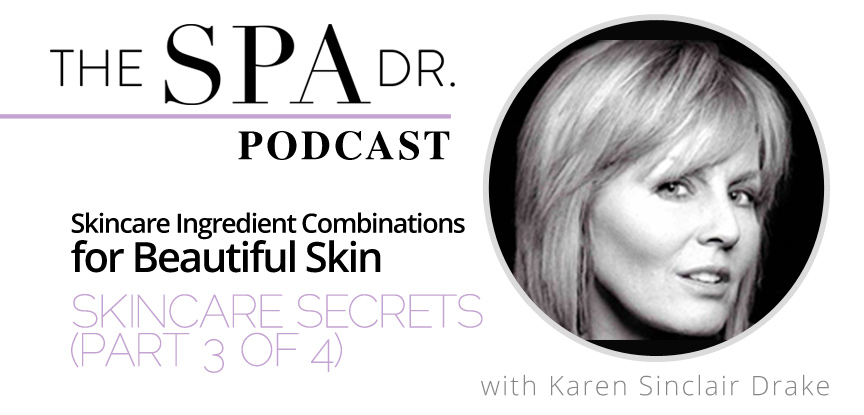
Thursday Oct 29, 2015
Thursday Oct 29, 2015
Our guest today is natural skincare expert Karen Sinclair Drake. Karen is in charge of strategic development and research and development at Cosmetic Research Laboratories, and also lent a helping hand in creating the upcoming SPA Dr. Daily Essentials skincare line. In part 3 of our 4-part Skincare Secrets series, we talk about combining natural ingredients to promote beautiful skin and along the way you’ll learn:
- How pH affects your skin.
- The top ingredients in natural skincare.
- How to use a natural approach to treat common skin conditions, including rosacea, eczema, and acne.
- Exclusive details on the upcoming SPA Dr. Daily Essentials skincare line. Sign up to be a VIP here and get priority access.
The Importance of Maintaining a Healthy Skin pH
Skin needs acidity to function in a healthy manner and natural skin is pH5 or lower. Using topical alkaline products causes an imbalance of good bacteria, so it is important to only use mildly acidic products on your skin.The Best New Natural Skincare Ingredients
- Virgin Cold-Pressed Camelina Seed Oil: Packed with omega 3 fatty acids, which can reduce inflammation.
- Organic Seabuckthorn Seed Oil: Nourishes and promotes tissue regeneration, reduces signs of aging, and skin wrinkling.
- Pullulan: Possesses antioxidant benefits and has an instant lifting effect on the skin.
- Pichia-Resveratrol Ferment Extract: Reduces fine lines and wrinkles and also firms and lifts skin.
The Best Traditional Natural Skincare Ingredients
- Cocoa and Shea butter
- Virgin Cold-Pressed Vegetable and Fruit Seed Oils: Especially jojoba oil
- Almond Oil: Packed with antioxidants and high in proteins that help repair the skin
- Hemp Seed Oil: Very high in essential omega fatty acids
- Essential Oils: Smells great and possess topical benefits for the skin
- Coconut Oil: Excellent as a cleanser when combined with the right ingredients and is gentle on the skin
Using Natural Ingredients to Treat Common Skin Conditions
Treating skin conditions requires a two-prong approach: Using topical products that are mildly acidic and keeping yourself as alkaline as possible internally. Aging Skin and Premature Aging Using products that are mildly acidic will offset premature aging. Karen also suggests incorporating internal supplements with anti-inflammatory properties.Mild acidity is truly the fountain of youth.Inflammatory Skin Conditions Common skin conditions such as rosacea and eczema are often correlated with increased skin pH (alkaline skin). Ingesting alkaline foods has anti-inflammatory benefits on your skin. You can also try reducing carbohydrates (bread, rice, pasta, etc.) to inhibit gut bacteria fermentation and bacterial overgrowth. Acne Do not over sterilize or over wash your skin. This leads to increased oil production that will trigger even more acne. Support good gut health by eating probiotics and fermented foods, and reduce your intake of cow’s milk and refined sugar.
The SPA Dr. Essential Daily System
Karen contributed her wealth of knowledge to Dr. Cates’ upcoming SPA Dr. Daily Essential skincare system and provided a wonderful overview of what you can expect from the line! CLEAR Gentle Cleanser With ingredients such as argan oil, virgin cold-pressed coconut oil, and aloe vera, this gentle cleanser is suitable for all skin types. It removes debris without disturbing the skin’s natural barrier and doesn’t leave a greasy residue. NOURISH Antioxidant Serum Containing an award-winning brightening extract enhanced with resveratrol and aloe vera, your skin will feel lifted and hydrated. RENEW Enriched Moisturizer Made with camelina oil, seabuckthorn seed oil, argan oil, turmeric and ginseng, this enriched moisturizer feels lightweight and fresh. ENHANCE Glow Boost Made with coq10, vitamin E, fruit seed oils, and rosehip oils, this elixir can be used on its own or mixed with the moisturizer to give your skin an added boost. Get priority access to the upcoming Spa Dr. skincare line here.About Karen
Karen Sinclair Drake heads strategic development and research and development at Cosmetic Research Laboratories. A recognized leader in functional beauty, anti aging, and the natural treatment of skin conditions, she is also dedicated to the green chemistry movement, which seeks to develop products and processes that will pose little, or no harm to living things or the environment.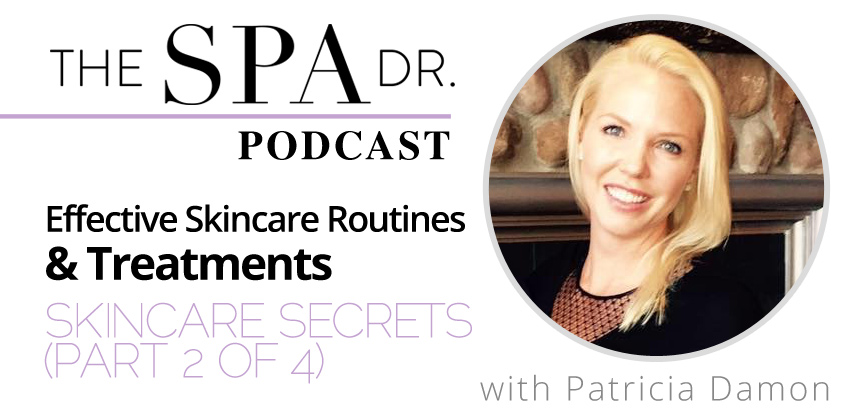
Thursday Oct 22, 2015
Thursday Oct 22, 2015
Our guest Patricia Damon is a graduate of the International Dermal Institute in California, the owner of Zanté Spa in Deer Valley Utah, and my personal esthetician.
In part two of our four-part Skincare Secrets series, we discuss the incorporating facials and cleansing into your regular skincare routine as we prepare for the launch of The Dr. Spa skincare line (click here to get on the VIP list and get priority access).
We also talk with Patricia about different treatments and natural ingredients for managing common skin conditions, including dehydration, acne, hyperpigmentation, enlarged pores, and rosacea.
Making Facials Part of Your Skincare Routine
Patricia recommends getting facials at the start of each season to combat problems associated with changing weather and environmental aggressors.
To address specific skin conditions, schedule a series of weekly treatments during the shoulder months (mid-season) when the weather is less variable. Some of the common issues that facials can help treat include:
- Dehydrated Skin
- Acne
- Premature Aging
- Hyperpigmentation
Patricia recommends that you speak with your esthetician to come up with a custom treatment to cater to your specific skincare concerns and create a schedule that works well for you.
Remember, facials aren’t just for women; they work just as well on men!
Treating Common Skin Conditions
- Dehydrated Skin: For oil dry skin, use shea butter, jojoba, and primrose oil to get oils back into the skin. Hyaluronic acid can be effective on water dry skin.
- Acne Prone Skin: A good exfoliation can extract congestion in your skin. Patricia also recommends using gommage from the karite tree, karite butter, and clay masks to help absorb the overproduction of oil
- Hyperpigmentation: Use citrus acids to exfoliate and target hyperpigmentation.
- Rosacea: Look at ingredients that soothe and calm the skin, such as chamomile and arnica.
- Clogged and Enlarged Pores: Products such as thyme and mild salicylic acid can help. Keep your skin cleansed and exfoliated to minimize the appearance of pores, but leave pore extraction to the professionals.
Patricia’s Recommended Daily Skincare Routine
1. Cleanse your skin in a two-step process:
- Remove surface, dirt, oil, makeup, debris, and environmental aggressors.
- Cleanse the pores.
2. Apply a toner. This will bring your skin back to a natural pH balance.
3. Apply a treatment serum to address any skincare concern you may have.
4. Apply a moisturizer. Patricia recommends a moisturizer with SPF in the morning, but not at night.
Maintaining Good Skin While Traveling
Air travel dehydrates the skin, so avoid peels and aggressive exfoliation before flying. Patricia recommends applying a hydrating mask while flying. If you’re not comfortable with that, mildly exfoliate your skin once you land and sleep in a hydrating mask that night.
You can infuse hydration into your skin while in flight using toners.
Links to Check Out
Zanté Spa
Get on the VIP list for The Dr. Spa skincare line
About Patricia
Patricia Damon is a graduate of the International Dermal Institute and is trained in both medical and Ayurvedic skin care techniques. She worked as a national educator for a top skincare line in Europe and an instructor at one of the first accredited esthetic colleges in the United States. She was also the founder and president of RejuvenAir, a world-class in-flight spa service. Patricia currently owns Zanté Spa, a beautiful boutique spa at the base of Deer Valley Resort in Utah.
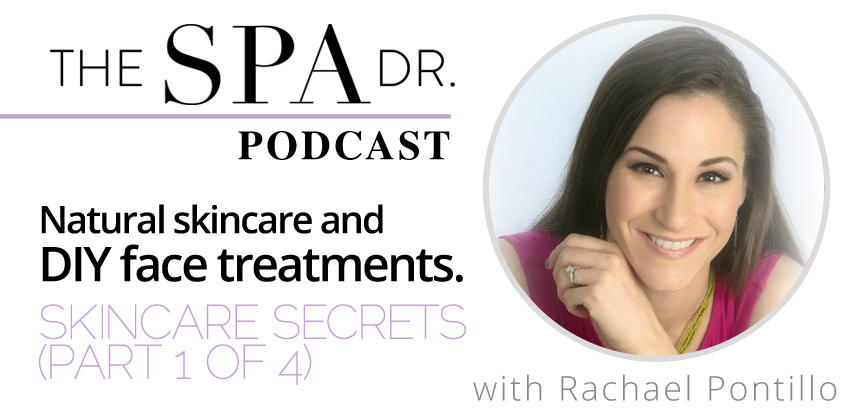
Thursday Oct 15, 2015
Thursday Oct 15, 2015
Our guest Rachel Pontillo is an expert at helping people with skincare and DIY face treatments as she’s a Certified International Health Coach, licensed aesthetician; and natural skincare formulator and educator.
We’re diving into a four part series on Skincare Secrets talking all about natural and effective external treatments as we’re getting ready to launch The Spa Dr skincare line. Click Here to Get on the VIP list and get priority access.
We talk about the benefits and uses of Jojoba oil. Always be aware of purity and where you get your oils from as it makes a huge difference. If your products ever go rancid it’s not going to be good for your skin!
Jojoba oil has a ton of uses, but just like with any oil it’s not perfect for everyone. Jojoba oil can block pores for some people and not for others, if it does there are numerous options to look at and replace with. We have a conversation about alternatives and how they might work for you.
Want to learn how to create an awesome DIY toner?
Rachael shares her formula around the 15 minutes mark.
What to do about Hyperpigmentation
Rachael shares how she’s starting to see more and more hyperpigmentation with younger people. Although hydroquinone is the go to ingredient of over the counter and prescription products some of the side effects are worth looking into. (maybe even going the extreme direction and causing vitiligo)
She’s seen green tea and black tea extract work very well with clients over time. It does take time topically and internally however, as with anything give yourself 30 days to see if it’s working or not.
Try using Rose Water, cucumbers, and ice to start reducing puffiness around your eyes.
Links to Check Out
Rachael’s Past Interview on The Spa Dr Podcast
Rachael’s website Holistically Haute
About Rachel
Rachael Pontillo is the bestselling author of the book Love Your Skin, Love Yourself, and co-author of The Sauce Code. She’s an AADP and IAHC Board Certified International Health Coach, licensed aesthetician; and natural skincare formulator and educator.
She’s the creator of the popular skincare and healthy lifestyle blog, Holistically Haute, as well as the 6-week online course, Create Your Skincare.
Rachael received her health coaching education from the Institute for Integrative Nutrition®, where she was the recipient of the school’s prestigious Health Leadership Award, and her aesthetics education from the Vision Academy Paul Mitchell School.
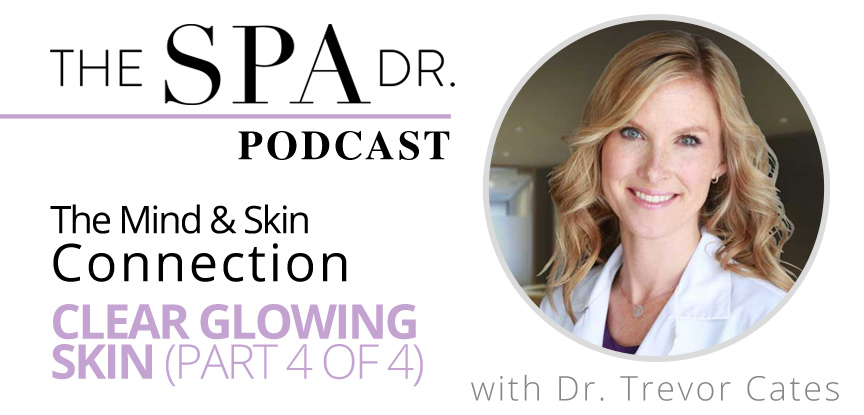
Thursday Oct 01, 2015
The Mind and Skin Connection (Clear Glowing Skin part 4 of 4)
Thursday Oct 01, 2015
Thursday Oct 01, 2015
Today we’re covering the mind & skin connection – which is often not talked about as skin issues are often thought of just as an external issue – or a vanity problem, however, we all know it goes much deeper than that.
You’ll hear about how I struggled as a little girl with self-esteem issues due to being bullied at school since I was different, and missed out on a lot because of health issues – I had skin reactions to medications and constantly felt alone as we tried to find a solution to my health.
Skin conditions like acne, eczema, rosacea, psoriasis, vitiligo and even premature aging can both cause AND be triggered by stress!
What Stress Will Do To Your Skin
- Acne: When you are stressed out, your adrenal glands release the hormone cortisol. A surge in cortisol causes increased sebum production, which triggers acne.
- Eczema and other skin conditions: Anxiety and stress at work, school, and home can make skin conditions flare up.
- Vitiligo and Psoriasis: Stress negatively impacts our immune system and being anxious or stressed can aggravate these autoimmune conditions.
- Aging: Excessive frown lines, happen more with chronic stress. High levels of cortisol are likely to cause swelling, insomnia, weight gain. – which makes the aging process worse.
Covering up skin blemishes with makeup or trying to turn back the clock with botox/plastic surgery and topical steroids can suppress a skin eruption – Yet none of these address your skin problem!
A survey was done by the National Rosacea Society, 70% of people with severe rosacea symptoms said it negatively affected their professional interactions, and 41% said rosacea made them avoid public contact or cancel plans.
Top 10 Tips to Decrease Stress to Enhance your Mind, Mood and Skin
- Laugh – When we laugh, our cortisol levels drop and serotonin (our mood-boosting neurotransmitter) increases. It’s really the fastest and easiest way to stop stress fast.
- Breathe – This might seem like a simple task, but most people don’t know how to breathe to relieve stress. The first step is to be aware of your breathing. Next, take deep breaths that expand your chest and belly while relaxing your muscles in your neck and shoulders. (Tip: try counting to 10 breathing inward and then another 10 count breathing out.)
- Surround yourself with positive people – We can’t always choose who is around us at work and school, but we can choose the people we are with, in our free time. When we’re positive too, our skin is more likely to heal and have a healthy glow.
- Do visualization exercises – It only takes a few minutes and can quickly reduce stress. Close your eyes and picture a scene you love such as a beach, mountaintop, or picnic spot, and sit quietly to fully experience the beauty, serenity and joy it brings. If you have skin issues, you can also visualize healing of your tissues and healthy, glowing skin taking over.
- Get outside – Get away from your computer, phone, and stressful situations and into nature. Even if it’s just a walk around the block, a few moments in the sun or fresh air it can boost your mood and give you a little extra Vitamin D to brighten your day.
- Move your body – Studies show that moderate exercise improves our energy, mood, and sleep. If we exercise every morning, it can help balance our adrenal function to help us better cope with stress.
- Sleep soundly – Sleep is essential for helping us energize, manage stress, stay focused and be positive. Optimally, we should all get about 8 hours of uninterrupted sleep each night. (Tip: Try taking a warm bath with a few drops of lavender essential oil and some Epsom salt before bedtime.)
- Eat a healthy diet – Include plenty of fresh fruits, vegetables and high quality protein to ensure your body has all the nutrients it needs to keep your hormones balanced and your skin healthy. (Tip: Start your day with a nutrient-packed smoothie and skip the grains and sugar.)
- Practice gratitude – Gratitude is about appreciating what you have around you. Research shows gratitude helps us feel happier, improve our health, be better at dealing with problems that arise, and build solid relationships. (Tip: Start a gratitude journal and write down 1 thing every day that you’re grateful for.)
- Meditate and/or pray – Research shows that meditation helps you lower stress, be more compassionate, improve sleep, boost mood, decrease inflammation, and even lower yearly doctor costs! The goal of meditation is to focus and quiet your mind in order to have greater clarity and inner calm. (Tip: Simply close your eyes and focus on a word that brings you a sense of peace. Let go of all other thoughts.)
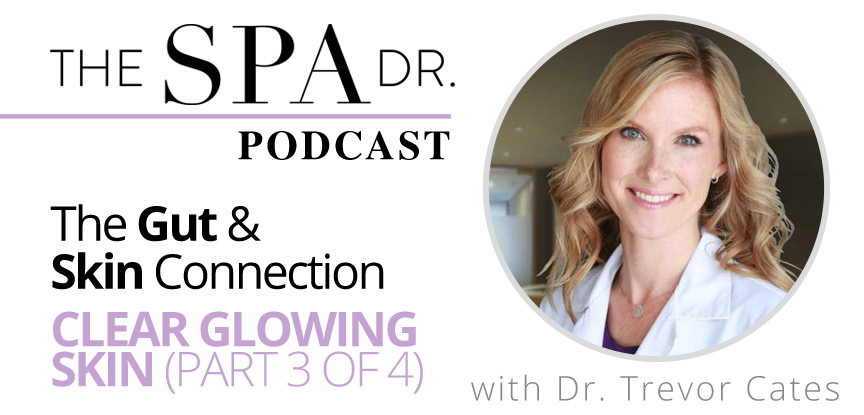
Thursday Sep 24, 2015
The Gut and Skin Connection (Clear Glowing Skin part 3 of 4)
Thursday Sep 24, 2015
Thursday Sep 24, 2015
Today we’re covering the gut and skin connection – how digestion affects our skin and what we can do about it. This might seem like an unlikely connection and your dermatologist or esthetician probably hasn’t talked with you about it.
It really is a key component in having healthy skin and overall health!
Digestion is important for breaking down and absorbing nutrients in our food. We need certain micro and macro nutrients for healthy skin – that we get thru a healthy diet. But, you could have the best diet in the world but if your digestion is not working, then you won’t get the nourishment you need and it does show up on our skin.
As more and more research is showing, the bugs within our digestive system are not only important for digestion but they’re also connected to our skin.
Two common digestive problems
One thing that can happen is Hyperpermeability of the digestive tract lining (or what is sometimes called “leaky gut syndrome”).
The other is constipation. If your exit route of eliminating waste and toxins — is closed, then your body is not able to get rid of these elements and our system gets backed up.
How do you know if you have digestive issues?
Your symptoms will tell most of it – if you have problems such as diarrhea, constipation, undigested food particles in the stool, small or incomplete stools, heartburn, pain, gas or bloating.
Many people have digestion, absorption and assimilation issues, and don’t even know it!
In my practice, I often do specialty lab testing to determine if people do in fact have one of these issues. If you’re having skin issues and the treatment you’re doing is not working then this is something you might want to take a closer look at with your healthcare provider.
Here are some quick tips to enhance your digestion:
- Manage stress – every day
- Stay away from unnecessary medications.
- If you have bloating, gas, heartburn, diarrhea or constipation, add probiotic supplements and/or fermented foods like (kimchi or sauerkraut) to help restore the beneficial microorganisms that keep your digestive system working smoothly.
- Consider nutritional supplements like L-Glutamine to help repair damage to the digestive tract lining.
- Eat fiber and nutrient rich foods.
Cleansing and detoxification seem to be overused these days and have lost some of their meaning, however, there are some symptoms to look for when your body does need to detox.
Common symptoms to ramp up your body’s detoxification:
- Feeling tired
- Headaches
- Bad breath
- PMS, irregular menstrual cycles, infertility and other signs of hormone imbalances
- Irritability and mood swings
- Difficulty focusing
- Inability to lose weight
- Skin rashes, eruptions, and itching
- Chronic muscle or joint pain
You can strengthen your detoxification pathways by consuming nourishing foods, exercising regularly, and drinking filtered water and herbal teas. I recommend doing a well-designed cleanse program at least once per year.
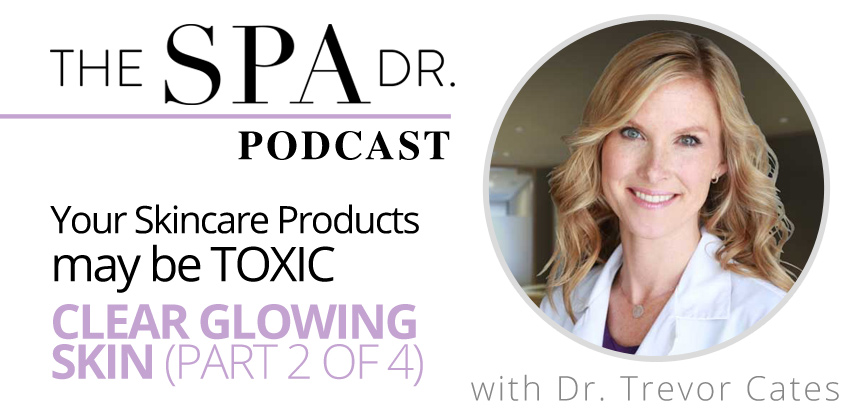
Thursday Sep 17, 2015
Your Skincare Products May be Toxic – Clear Glowing Skin (part 2 of 4)
Thursday Sep 17, 2015
Thursday Sep 17, 2015
Today we’re covering top toxic triggers in skincare products and some shocking ways these may be impacting your health and your skin. Although you may think just putting something on your skin isn’t a problem, we actually absorb chemicals through the skin.
The National Institute of Occupational Safety and Health reported that nearly 900 toxic chemicals are used in skincare and cosmetic products.
One of the biggest issues with many skin products are Endocrine disrupting chemicals. EDCs have been linked to a number of health concerns including infertility, lowered sperm counts, obesity, diabetes, menstrual irregularities, early menopause, thyroid imbalance, and certain types of cancers.
10 harmful ingredients to watch for
1. Formaldehyde: A known carcinogen and irritant found in nail products, hair dye, fake eyelash adhesives, and some shampoos.
2. Fragrance/Perfume: A source of hidden chemicals such as phthalates, which is a Endocrine disrupting chemicals.
3. Lead: A known carcinogen and hormone disruptor is found in certain eyeliners, hair dye, and lipsticks but it’s never listed because it’s a contaminant, not an ingredient.
4. Mercury: A known irritant and allergen that, with body accumulation over time, can impair the brain and nervous system. Often found in skin lightening creams, mascara and some eye drops.
5. Parabens (Propyl-, Isopropyl-, Butyl-, and Isobutyl-): A preservative found in many products.
6. Oxybenzone: Active ingredient in chemical sunscreens that accumulates in fatty tissues and is linked to allergies, hormone disruption, cellular damage, even low birth weight in babies of mothers using it.
7. DEA/TEA/MEA (Ethanolamines): Used as emulsifiers and foaming agents for shampoos, body washes, soaps and topical application has been associated with cancer in animal studies.
8. Sodium lauryl sulfate (SLS, SLES): A former industrial degreaser now used to make soap foamy, it’s absorbed into the body and irritates skin.
9. Coal Tar: Used in hair dyes. Also, a coal-tar hair dye containing p-phenylenediamine (PPD) can cause dangerous skin reactions in some people.
10. Diethylene glycol (or DEG): A Central Nervous System depressant and potent kidney and liver toxin. Sometimes found in fragrances.
If you can’t put it in your mouth don’t put it on your skin.
There are so many toxic triggers that might be affecting your skin. Make sure to be careful about what you’re putting in your body (and on), so you can. Don’t be overwhelmed there are alternatives!

Tuesday Sep 08, 2015
2 Foods To Avoid At All Costs for Clear Glowing Skin (part 1 of 4)
Tuesday Sep 08, 2015
Tuesday Sep 08, 2015
In today’s episode we’re starting off with part 1 of 4 talking about the essential keys to clear glowing skin. Today we’re going to talk about the importance of diet and exactly what foods you should focus on eating and staying away from.
We start with the question:
Why is it that I develop acne now that I’m no longer a teenager? Is it due to hormones? Are there any foods that can help?
It’s a myth that people only get acne in their teens. It can honestly happen at any time.
Hormones change over time and can play a large role in acne flare-ups. (pregnancy, breastfeeding, teenage years are all times this can happen) Also stress (cortisol) can factor into acne and increase as we age. (causes inflammation and ultimately acne)
The best way to balance this out is with Cruciferous vegetables (broccoli, kale, brussel sprouts, onions, garlic, beets, etc. These are great foods to start with to get your hormones back in balance.
4 Critical Foods For Clear Glowing Skin
Colorful fruits and vegetables. (especially berries and greens)
These foods are high in antioxidants that help to stop wrinkles and sagging skin.
Bone Broth
This food is full of collagen. Always choose organic and grass fed if possible. And for those of you that aren’t keen on meat, check out gelatin.
Good Fats
We need the good fats to nourish the lipid bilayer. (not the trans fats) Some foods to get you started with eating good fats are wild caught salmon, avocado, and coconut oil.
High Quality Protein
We need protein so our body can repair skin. Nuts, seeds, legumes, grass fed beef, chicken, and fish.
2 foods to avoid for clear glowing ageless skin.
#1 – Sugar
Americans eat on average 22.2 teaspoons of sugar every day
Sugar is found in a lot of hidden sources like bread, salad dressing, soups and more. It’s highly addictive and highly destructive, and we know it’s particularly bad for the skin.
It’s a direct link to acne causing oils in the skin and an age accelerator.
#2 – Dairy
Dairy products are pro inflammatory foods as well as being full of hormones (regardless of where you get your milk) Both of these factors are triggers for acne.

